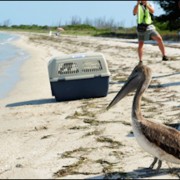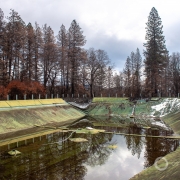Peter Gleick: Who Is Stealing California’s Water?
Someone is stealing our water. Many someones. But who and how much? No one knows today, mostly because the agency responsible for keeping an eye on water rights and use–the State Water Resources Control Board–is blind, deaf, and dumb.
Blind, because they don’t look. Deaf, because they don’t listen to or act on most requests to investigate water rights allocations and use. Dumb, because they don’t talk about these issues. “Asleep at the switch,” as a colleague describes it.
What do I mean by stealing water? I mean people extract water from our rivers and streams without a right to do so. Legal water rights are managed by the State Board. Water rights permit and license holders are required by the California Code of Regulations to file reports with the State Water Board on their water diversion and use amounts. Fewer than 70 percent of permit holders actually submit these reports. There is no penalty for failure to file a report and, worse, no verification of the numbers reported. Further, information is not available to compare face value of water rights to actual use. Some, perhaps many, rights holders are likely taking more than their right allows.
Moreover, the State Board does not have authority over the earliest water rights claims–so-called Pre-1914 rights–and the Board estimates that there are approximately 1,600 unreported Pre-1914 and riparian diversions in the Delta. How much water are these diverters taking? No one knows, or looks, or measures. The story is even worse for groundwater. Percolating groundwater is not subject to the State Water Board’s permitting system (as though it was magically different from surface water. It isn’t.) and, in most of the state is not regulated by any other public agency. How can we sustainably manage what we don’t even measure? Where is our groundwater going? What is the effect of this groundwater use on surface flows? Who knows?
As bad as things are for understanding existing rights and use, there are thousands of water users extracting water with no rights at all. Or so we think. Why don’t we know?
Water Number: Eight. There are only eight people statewide with responsibility for policing water theft and rights violations at the State Water Resources Control Board, and even they have other demands on their time. Republicans (and some Democrats), in the recent debate over water legislation, opposed increasing that number to around 30, and also opposed more stringent requirements that water uses be measured and reported.
Why? Because a small number of powerful people, though not most of us, and certainly not the environment, benefit from our ignorance on this issue. If actual water uses were limited to those allowed by water rights, some of us suspect that there would be a lot more water left in the rivers or available to junior water rights holders. Maybe a part of the problem with water in California, and part of the problem with the health of the Delta fisheries, is water theft, not just over-allocation and inefficient use. Wouldn’t it be nice to know?
But this would require–gasp!–actually measuring and monitoring all water use, from surface sources to groundwater. And it would require enforcing water rights. What radical concepts. It is time for Californians to demand that we stop pretending that water is free and unlimited, available to anyone who can put a siphon in a river or drill another groundwater well. When these things are left unregulated, or as badly regulated as they are now, we rob current and future generations.
Peter Gleick
Dr. Gleick’s blog posts are provided in cooperation with the SFGate. Previous posts can be found here.









This is an insane situation I have seen it on TV. Arnold doing everything he can. I dont see a solution here but our renewable energy solution maybe able to help. We have a water component build into the EcoEstates and also enough power to run a desal plant. 2 options
SUSTAINABLE CLEANTECH SOLUTION TO IMMINENT CLIMATE CHANGE
DISASTER
Sunshine Coast, October 25, 2009 – With less than two months to go before the UN Climate Change Conference, the leaders of most countries are a worried lot. EcoEnforcers, a Queensland, Australia based company, has come up with a sustainable renewable energy source that meets both short term as well as long term needs. It is a global solution to urban renewable energy using a biomass hybrid battery technology to produce 2 x 1MW of power, 1MW for their fully designed “EcoEstates” and 1 MW put into the grid.
In the words of Jarreau Terry: “EcoEnforcers will lead the global economy for climate change. Nations within nations will prosper, and single-handedly be withdrawn from the global financial crisis. A momentus occasion that will inevitably re-define the Twenty-First Century.”
http://www.ecoenforcers.com
Contact:
Jarreau Terry, Founder & CEO
pr2@ecoenforcers.com
As Mark Twain once said, “Whiskey’s for drinking, water’s for fighting.” This has been acutely obvious over the last 150 years in Colorado as competing interests try to meet their own water demands. The effectiveness of any water rights system is only as good as the administration of that system and having the largest single site brewery in the world located in an over-appropriated Colorado watershed has taught us to appreciate the Colorado Doctrine as it relates to our water laws (aka, the doctrine of prior appropriation) and the administration of water rights by the Office of the State Engineer.
Two things have been critical to the relative success (fights still continue and water theft does occur) of the administration of water within Colorado. First, the State has the people and the processes in place to administer and manage water rights. Water Commissioners monitor day-to-day operations and a dedicated “water court” provides the legal backdrop for resolving conflicts. Second, most water basins within the state have active forums, boards and foundations that encourage discussion, community engagement, education, outreach and even the management of State or Federal grants for water related projects that support the stakeholders. In addition, these “stakeholders” are comprised of more than just municipal, agricultural and industrial interests, but also include environmental, recreational, state and federal entities. Of note, environmental and recreational interests can obtain a defined water right (e.g., related to stream flows) within Colorado.
Historical and modern day experiences in Colorado continue to teach us that water is a resource that will only become scarcer as population grows and cyclic and permanent climate changes are experienced. Through both the active administration by the State and the participation of the stakeholders (who also vigorously challenge, educate and collaborate with State and Federal agencies), water threats and challenges are faced with an “eyes wide open” approach to planning and management that will hopefully protect and provide for future generations of stakeholders.
Ignoring water threats, disputes and challenges is unacceptable and falls in a “pay me know, or pay me later” routine. The burden often falls on those that are injured by the theft or mismanagement of water rights. We believe that Dr. Gleick’s article is dead-on in that we must stimulate, encourage and challenge the discussions around the current and future state of water and the overwhelming need to aggressively administer this precious resource. Without the proper administration of existing water rights, and an appropriate level of stakeholder interaction, water users will continue to “steal” water as needed rather than plan for the future. Ultimately, it may fall on the stakeholders to drive accountability for the administration of the water rights and, unfortunately, it sometimes requires the legal water rights holders to sue those that are stealing the water; an additional unacceptable burden of the water right holder to play the part of “administrator.”
Molson Coors appreciates the challenges that Dr. Gleick has presented. Specifically, it would appear that California could learn a lot from both the governmental agencies and broad base of stakeholders within Colorado (we would suggest that a strong opportunity exists for dialogue between all interested parties).
Editor’s note: Molson Coors is a Circle of Blue contributor and has supported Circle of Blue’s independent reporting and research, including the recent GlobeScan survey project, WaterViews.